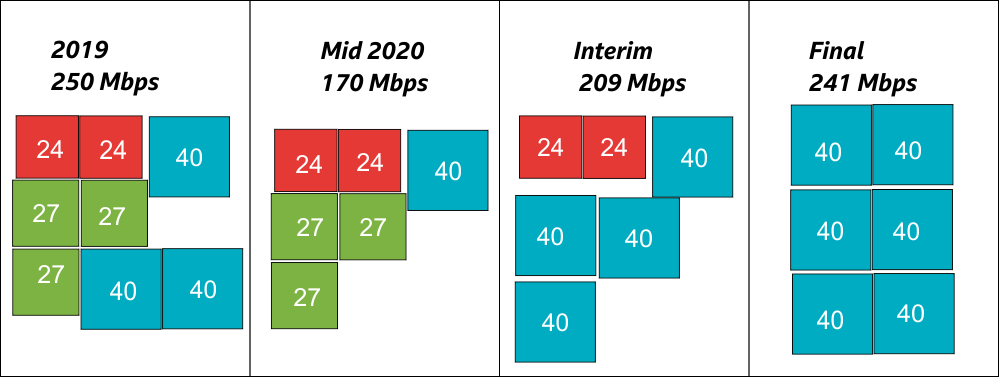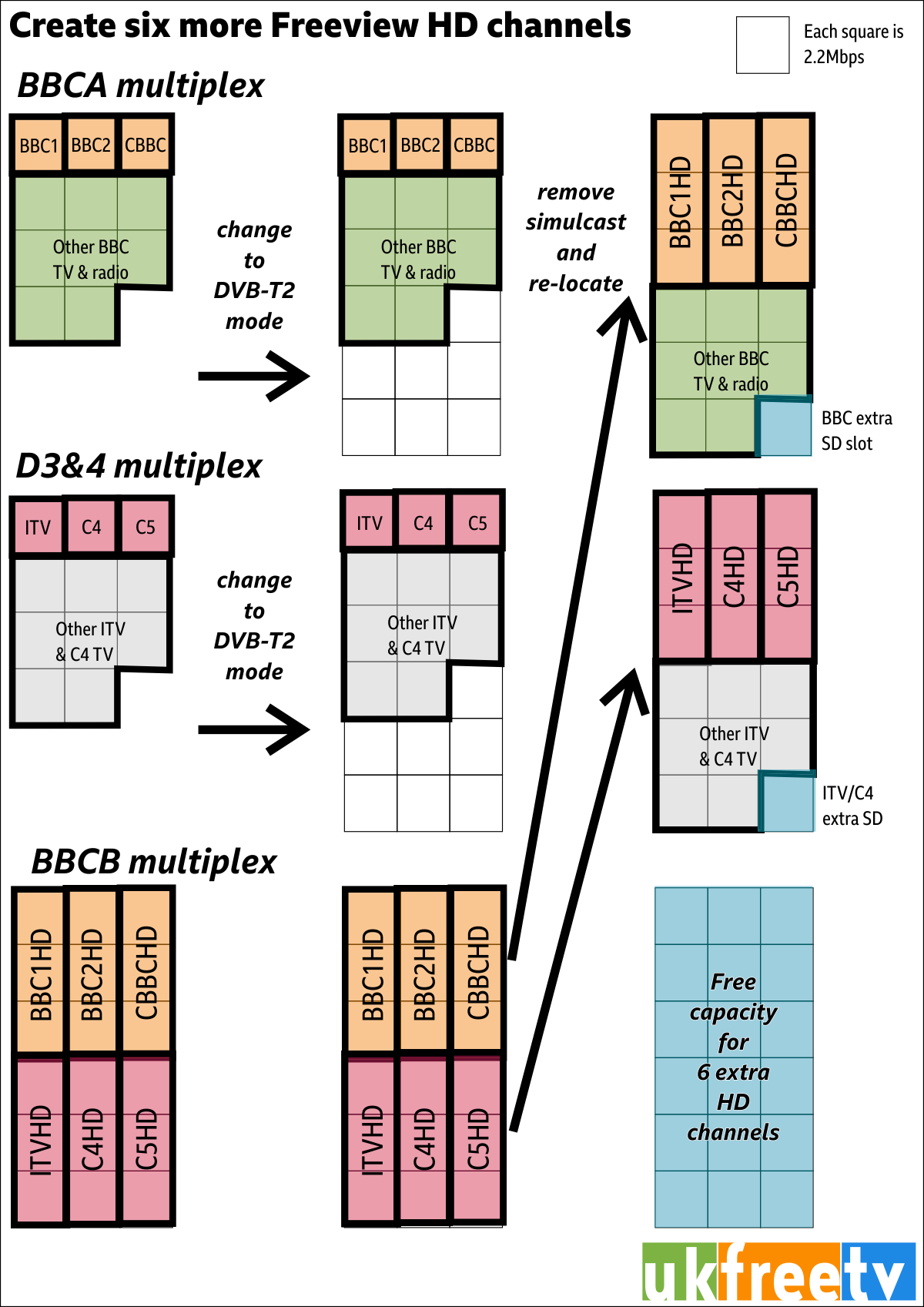Rebuilding Freeview High Definition from 2019 onwards

As Freeview High Definition users in Cornwall already know, the number of TV channels being broadcast in the UK will be cut back in mid-2020 to make way for the fifth generation of mobile phone data services.
This is because the number of multiplexes being broadcast will be cut back to the original six. The extra two were provided as a “interim service”. A Freeview multiplex is a single broadcast of binary data that occupies a 8MHz frequency range. In the UK each of these can carry 24.1, 27.1 or 40.2Mbps or of data.
Because older TV sets and set-top boxes can only work with 24.1 Mbps, it is only possible for the owners of the multiplexes to use the higher capacity modes when every home has switched to Freeview HD capable equipment. This equipment is marked with “DVB-T2”.
As illustrated, the total bitrate (in a home that can receive all the multiplexes) will change over time.

Meet the multiplexes
Not all the multiplexes are the same:
- only three are broadcast to the whole of the UK;
- a different three are broadcast in the better DVB-T2 mode;
- legally, only BBC channels may appear on BBCA
- also, legally, only public service broadcast channels (ITV, C4, C5) can appear on D3&4
- The HD mode multiplexes have more bits and use a more video efficient encoding system (MPEG-4)
- The current license to broadcast have different end-dates
This can be summaries in this table.
|
Multiplex name |
Expires |
HD mode? |
Coverage |
Mode |
Bitrate today |
||
|
com7 |
21 June 2020 |
Yes |
76% |
6 |
40.2 |
||
|
com8 |
21 June 2020 |
Yes |
76% |
6 |
40.2 |
||
|
D3&4 |
15 November 2022 |
No |
100% |
3 |
24.1 |
||
|
ARQA |
15 November 2026 |
No |
90% |
8 |
27.1 |
||
|
ARQB |
15 November 2026 |
No |
90% |
8 |
27.1 |
||
|
SDN |
15 November 2026 |
No |
90% |
8 |
27.1 |
||
|
BBCB |
16 November 2026 |
Yes |
100% |
6 |
40.2 |
||
|
BBCA |
31 December 2027 |
No |
100% |
3 |
24.1 |
Freeview requires about 2.2Mbps for a standard definition channels and three times that for a high definition one (6.7Mbps).
The Freeview HD EPG problem
One problem for people with Freeview HD receivers will note is that HD channels are grouped together in the program guide, rather than appear as replacements for the standard definition channels as viewers expect. This is because the six channels on the BBCB multiplex (BBC One, BBC Two, CBBC, ITV, Channel 4 and Channel 5) can only be seen on newer boxes, making channel number replacement impossible without breaking the oldest Freeview equipment.
Basically the UK-wide BBCA and D3&4 multiplexes can’t change mode until ALL homes can receive them.
The interim position
There is good news, however, for the SDN, ARQA and ARQB multiplexes. They can switch modes to the high definition whenever they feel that it is commercially practical. This might be at a lower level of Freeview HD box use, perhaps 80% or 90%.
By switching to DVB-T2 mode, each of them can increase their capacity from 27.1 to 40.2Mbps and take advantage of MPEG4.
.png)
So, of the 80Mbps lost when com7 and com8 close, half of that can be got back by SDN, ARQA and ARQB upgrading, which would be enough for an extra 6 full HD services.
The HD public service channels
This diagram explains what will happen to create space six more Freeview HD channels.

The gains for the BBC when everyone has a DVB-T2 receiver are larger. It will:
- No longer need half of the capacity on the BBCB multiplex (20.1Mbps) as it can move these channels to BBCA
- Gain 16.1 Mbps on BBCA due to the mode change;
- Gain 6.6 Mbps from not simulcasting three services in SD and HD
- Use the “gained 22.1Mbps” Be able to supply all the BBC television channels in HD to all UK homes
For the D3&4 multiplex, the gains are similar:
- No longer need the 20.1Mbps on BBCB, making it available for other UK-wide services.
- Gain 16.1 Mbps on D3&4 due to the mode change;
- Gain 6.6 Mbps from not simulcasting three services in SD and HD
- Be able to broadcast ITV, C4 and C5 in HD to all UK homes
I hope that's as clear as possible! Any qestions?
4:20 AM
I don't understand why local news programmes cannot be upscaled from SD to HD at the transmitter - I appreciate the quality would be less than HD, but it would save viewers having to change channels (if felt necessary, information could be displayed on the screen to advise that the picture is not in true HD). I have had a DVD recorder for at least 3 years which upscales SD to HD when plugged into an HD TV with an HDMI connector, so the technology is available - and cheap. The results are slightly better than SD.
| link to this comment |
10:17 AM
ArthurT:
The reason is that there are not yet enough DVB-T2 transmission 'slots' available. When there are more then it is likely that eventually all channels will be broadcast using DVB-T2 encoding, but not all channels will be in HD so several will remain in SD. To bring them up to HD will cost broadcasters a lot of money which the currently cannot afford.
| link to this comment |
11:03 AM
Well sorry me for speaking. But smart tvs are not really smart no matter what you self called experts say.
But if my tv is broke and the only tvs I can buy are 4k or more then I will be forced to buy one of them as there is not much else I can use that big space on the wall for. My dvd collection are not so good on my computer screen either. I suppose as all tvs will be hd or more then I am forced to buy them as I would still like to watch tv.
| link to this comment |
12:48 PM
John Martin: What do you mean by "smart TVs are not really smart"? Most new TVs are now 4k UHD as the cost of the screen panels has reduced to the point where it doesn't make sense for manufactures to continue using HD panels when there is little difference in cost. Production of SD TVs stopped a few years ago for the same reason when the cost of HD panels dropped.
| link to this comment |
12:14 PM
StevensOnln1: Well what do you mean by smart tvs. It is a word branded around today for all the gadgets the kids must have, Smart tv, phones, cars and even microwaves. No doubt I have missed a lot more must have items
| link to this comment |
3:07 PM
John Martin: Smart TVs are generally accepted to be TVs which provide other functions beyond watching broadcast TV, usually via internet connected apps and services. The same applies for smart phones vs basic phones, etc. They aren't necessarily must have items, but they can bring all sorts of benefits which many people have never thought of before using one.
| link to this comment |
10:19 AM
At least some people are now thinking there is more to life than must have. As apple and a few other companies are beginning to find out.
| link to this comment |
11:11 AM
John Martin: I wonder if 5G is going to cause TV problems ? like the 4G does?
| link to this comment |
2:32 PM
Gaz Pearce: Most viewers haven't suffered any interference from 4G, there are only a relatively small number of confirmed cases, which were easily resolved by fitting a filter. Those same viewers may need to eventually fit a 700MHz filter to replace their 800MHz filter once 5G has been rolled out on the 700MHz band in their area, but that is some way off yet as the 700MHz auction isn't due until next year and it will take a long time for the mobile networks to roll it out across the country.
4K UHD channels take up a lot of bandwidth and there isn't enough available for any to be added to Freeview any time soon. It could happen in future, but it's more likely that the vast majority of UHD broadcasts will be delivered over satellite and internet connections.
| link to this comment |
